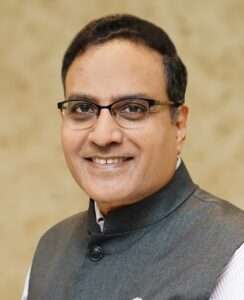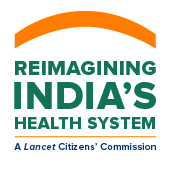In Conversation: Indu Bhushan, Chairperson, Partnership for Impact (P4i) and former CEO of National Health Authority
March 3, 2023

My journey in the health sector began 35 years ago, in 1988, when I was posted as Project Director of an externally-funded health project called the Sanitation, Water and Community Health (SWACH) Project in Udaipur, Rajasthan. It was an unconventional role for an IAS officer and , in fact, I felt side-lined out of the “mainstream” administrative track. This assignment, however, irrevocably changed my career path. As I got involved in the efforts to eradicate the guineaworm disease (medically referred to as dracunculiasis) in the three tribal districts of Rajasthan, I became deeply interested in health systems, community health and issues related to inequalities in health.
My work in SWACH prompted the Government of Rajasthan to post me as the first Director of IEC in the Department of Health and Family Welfare, another unconventional role. This time, I did not feel side-lined! Rather, I immensely enjoyed the challenge of developing and implementing mainstream information, education and communication activities in the health sector. This job deepened my interest in health systems and I decided to attend to the Johns Hopkins University for graduate training to gain greater understanding of the academic underpinning of the issues I had worked on in the field. After completing my Master’s and PhD in health economics, I worked in the health sector with the World Bank for two years and the Asian Development Bank for almost two decades.
I am not a researcher, but a practitioner with extensive experience of working in the health sector in several developing countries in Asia and Africa, including China, Thailand, Cambodia, Viet Nam, Mongolia, and of course, India. I have conducted, supervised and peer-reviewed several policy research activities and studies. My areas of interest are health financing, inequities in health, universal health coverage and health sector regulation.
I have joined the Commission relatively late. While I was a member of the Commission when it was established in 2020, I had to resign due to a potential conflict of interest at that time. Having (re-)joined the Commission only recently, my role will be to support various studies that are already in advanced stages. I intend to focus on my areas of interest, i.e., health financing and health sector regulation, in providing inputs to ongoing studies and the preparation of the Commission Report.
India’s journey to achieving UHC is still very long and will continue to be arduous. While there are several challenges in reaching this goal, I discuss three of them here.
First, public spending on health is too meagre to provide meaningful coverage of adequate quality and affordable health services. Government expenditure on health is one of the lowest in the world and the lowest among all the G-20 countries. This results in majority of healthcare being provided by the private sector and high out-of-pocket expenditure on health. Health financing in the country, largely based on out-of-pocket expenditure, is neither efficient nor equitable. This not only discourages timely and appropriate treatment, it also penalises the weaker and most vulnerable segment of population the most. While the government budget for health sector is inadequate, even this relatively small budget is not efficiently allocated and used. A greater proportion of budget needs to be allocated to primary health care, health research and non-communicable health programmes. Overall, the Government has to dramatically increase financing for the health sector to lay a strong foundation for achieving UHC.
Second, there is a huge variance in the availability, quality and access to health services across states, and between rural and urban areas. Several states, mostly southern, are on track to achieve UHC as they have consistently invested in strengthening health systems. However, a large number of states are far behind in this process and will struggle to achieve UHC in the medium-term. Good quality services are concentrated in some states and in the large urban centres in several states. Redressing these inequalities is another challenge facing the country.
Third, the country’s regulatory framework for ensuring quality, reliability and affordability of services is very weak. While there are a large number of laws for regulating services, health personnel, drugs, medical and assistive devices, data privacy, and pricing, many of these are outdated, involve too many players—resulting in weak accountability, and are not effectively implemented. In view of its inherent asymmetry of information and skewed power balance in favour of providers, the health sector needs much more effective regulations and grievance redressal mechanisms. Without these, we will not be able to achieve UHC.
The impact of the Commission will depend on the rigour of its analysis, specificity and feasibility of its recommendations, and effectiveness of their dissemination. A report based on rigorous analysis will find greater acceptability within and outside the government system. It will help if the recommendations are specific, feasible to implement, presented with detailed costing, and clearly demonstrate that other options are not as effective. The impact of the Commission will also be determined by its dissemination strategy. A report on the shelf of a bureaucrat never influences policy unless its findings and recommendations are widely discussed, and even challenged. Identifying a few champions and advocates will be important who could take up and push through the recommended reforms.
